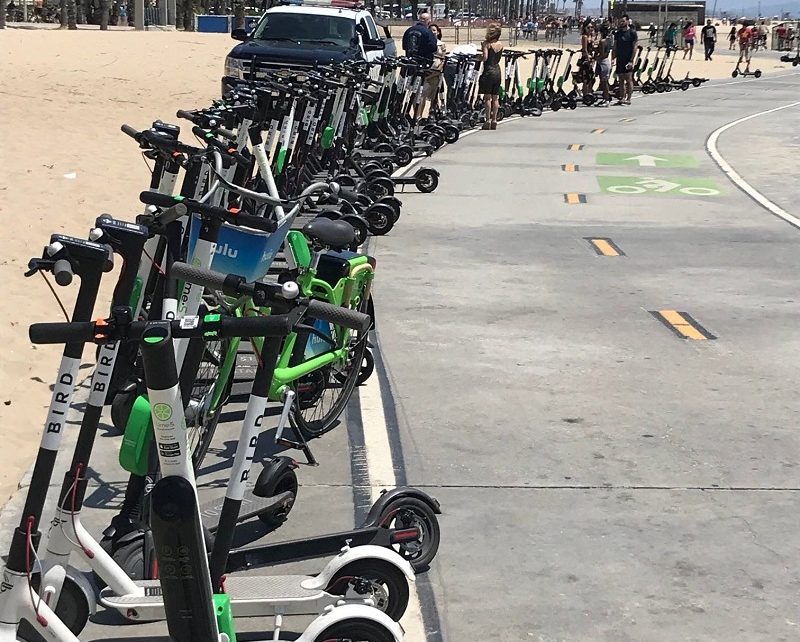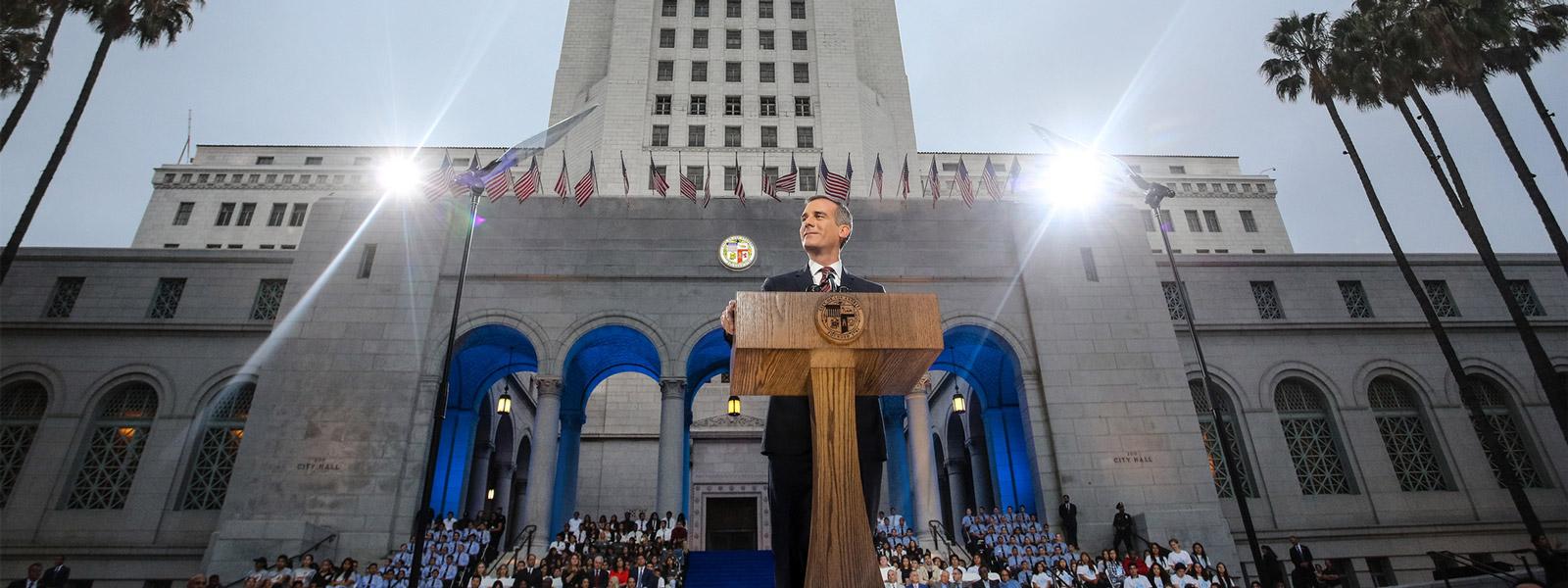
Electric scooters at Santa Monica Beach. (Photo: City of Santa Monica)
Los Angeles Sued By ACLU Over Digital Tracking Electric Scooters
ACLU attests that the digital tracking goes against the Fourth Amendment
By Evan Symon, June 10, 2020 2:15 pm
On Monday, the American Civil Liberties Union (ACLU) sued Los Angeles over the use of tracking technology in rentable electric scooters and the subsequent collection and use of tracking data where riders travel.
Tracking scooters in Los Angeles
In Justin Sanchez and Eric Alejo v. Los Angeles Department of Transportation and City of Los Angeles, the focus is largely on a digital tracking tool called the Mobility Data Specification program (MDS). According to the Los Angeles Department of Transportation (LADOT), the program is being used to manage private mobility providers and the public right of way. Costs, trip data, battery usage, parking verification, and other data collected would be used by LADOT for monitoring, regulating, as well as for future planning purposes.
However, despite LADOT giving assurances that all info is anonymous and that data would not be released outside of LADOT without a warrant, the use of MDS tracking has been called unconstitutional by the ACLU. Specifically, the ACLU is charging that tracking riders without their knowledge and the usage of such info is unlawful search and seizure, a violation of the Fourth Amendment.
“Renting an electric scooter should not give the government the right to trace your every move — where you start, where you end, and all stops, twists, and turns in between,” noted the ACLU in a press release. “The data does not include the identity of the rider, but that information can be determined in a number of ways. For example, when a trip begins at a home and ends at a sensitive location — such as a therapist’s office, marijuana dispensary, a Planned Parenthood clinic, or a political protest — all the government would need to know is who lives at the house in order to identify the rider and why the rider was making the trip.”
A lawyer for the ACLU clarified their position in the case. “The government’s appropriate impulse to regulate city streets and ensure affordable, accessible transportation for all should not mean that individual vehicle riders’ every move is tracked and stored without their knowledge,” said ACLU senior staff attorney Mohammad Tajsar. “There are better ways to keep ride-share companies in check than to violate the constitutional rights of ordinary Angelenos who ride their vehicles.”
A need for MDS and tracking by cities
LADOT and transportation officials have refuted these claims, stressing that the right to privacy would not be infringed and that the data itself would go to help cities.
” A lot of cities want tracking technology, specifically that MDS technology, in these new scooter operations,” said transportation consultant Robbie Amato. “These scooters are still relatively new to cities, and tracking them finds how they’re being used, where they are being used, and why they’re being used. The data isn’t being used to see where specific people are going. It’s general info, and it’s used to best figure out future needs such as where to put scooter charging stations, where to have more scooters located, possibly opening up a scooter only lane. And of course helping companies find ‘stolen’ scooters. Things like that.”
“Most cities want this data. I’ve worked with a few who had people up in arms against being tracked. After a meeting in Texas, a city official actually yelled at a guy bugging her about tracking where he went with, “All we want to do is put more scooters around you so there’s always one available! That’s it!”
“They aren’t even entertaining the notion of anything more than that beyond possibly giving police individual scooter data on where one was during a major crime or something. That’s it.”
The ACLU has noted that some MDS scooter data has been used in a case involving automatic license plate reader information, which resulted in an arrest, domestic abuse, and stalking, giving justification to their LADOT case to stop more of these events from happening.
The lawsuit, filed in the US District Court for the Central District in California, is expected to be heard in the coming months.
- Bill to Require Law Enforcement Disclosure if AI Was Used To Help Write Reports - August 7, 2025
- Gov. Newsom Files FOIA Request To ‘Expose True Cost’ Of L.A. Federal Troop Deployment for Anti-ICE Riots - August 6, 2025
- California Redistricting: How Newsom’s Plan Will Demolish Hard Fought GOP Gains - August 6, 2025




